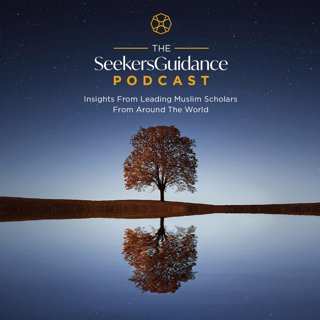
(Part 5 of 5) The Foremost Way of Seeking Forgiveness: Sayyid al-Istighfar Explained – Shaykh Muhammad Ba-Dhib
In this session, Shaykh Muhammad Abu Bakr Ba-Dhib concludes Imam Ahmad ibn Zayn al-Habshi's treatise on sayyid al-istighfar (the foremost way of seeking forgiveness). He continues looking at various methods of forgiveness and their virtues, first covering those narrated from the Prophet (Allah bless him and give him peace). In addition, Imam Habshi mentions other forms of supplication and formulas the saints and scholars—including his own teacher Imam Haddad—found effective. He closes by citing the “expiation for gatherings”— a particular form of seeking forgiveness used by the Prophet. Upon request from Shaykh Faraz Rabbani, Shaykh Ba-Dhib concludes the series by mentioning his own chain of authorization to teach the text, person by person, back to the author himself. --- This is part of the series presented in Ramadan 2018: "The Foremost Way of Seeking Forgiveness: Sayyid al-Istighfar Explained". In this five-part series, Shaykh Muhammad Abu Bakr Ba-Dhib covers a short treatise on explaining the foremost way of seeking forgiveness as has come to us from Prophet Muhammad (peace and blessings be upon him). The work, "Tiryaq al-Qulub w al-Absar fi Bayan al-Ulum allati Tadamanha Sayyid al-Istighfar" (The Healing of Hearts and Eyesight in Exposition of the Knowledges Contained in The Foremost Way of Seeking Forgiveness) is by Imam Ahmed bin Zain al-Habshi (d. 1145 AH). Text, transliteration and translation of sayyid al-istighfar can be found below. اللَّهُمَّ أَنْتَ رَبِّي لا إِلَهَ إِلا أَنْتَ خَلَقْتَنِي وَأَنَا عَبْدُكَ وَأَنَا عَلَى عَهْدِكَ وَوَعْدِكَ مَا اسْتَطَعْتُ أَعُوذُ بِكَ مِنْ شَرِّ مَا صَنَعْتُ أَبُوءُ لَكَ بِنِعْمَتِكَ عَلَيَّ وَأَبُوءُ لَكَ بِذَنْبِي فَاغْفِرْ لِي فَإِنَّهُ لا يَغْفِرُ الذُّنُوبَ إِلا أَنْتَ Allahumma anta Rabbi la ilaha illa Anta Khalaqtani wa ana abduka, wa ana ‘ala ahdika wa wa’dika mastata’tu, A’udhu bika min Sharri ma sana’tu, abu’u Laka bini’matika ‘alaiya, wa Abu’u Laka bidhanbi faghfirli fainnahu la yaghfiru adhdhunuba illa anta O Allah, you are my Lord. There is no god but you. You have created me, and I am your servant—and I am upon Your covenant and promise as best I can. I seek refuge in You from the worst of what I have done. I fully admit to You Your blessings upon me, and I fully admit to You all my sins. So forgive me, for there is none to forgive sins but You. --- For more SeekersHub podcasts and podcast shows, visit seekersguidance.org/podcasts. Help Seekershub build a Global Islamic Seminary and spread the light of guidance to millions around the world by supporting us through monthly donation by going to https://seekersguidance.org/donate - your donations are tax deductible in the US and Canada. To learn more about becoming a SeekersHub Helper please email: helpers@seekershub.org
3 Juni 201856min

Branches of Faith – 12: Civic Duties – Shaykh Muhammad Abu Bakr Ba-Dhib
In this session, Shaykh Muhammad Abu Bakr Ba-Dhib continues looking at the Branches of Faith relating to civic life from Imam Zabidi's treatise “ʿIqd al-Juman fi Bayan Shuʿab al-Iman" (The Necklace of Pearls in Clarifying the Branches of Faith). In this session, he looks at the Branches which relate to preserving the Five Necessities which the Sacred Law (shariʿa) has come to protect. The seven Branches mentioned in the text which come under the Five Necessities are: (1) preserving religion through fighting and combat, (2-3) preserving life through abstaining from injurious crimes and establishing their penalties, (4) preserving the intellect through the prohibition of intoxicants and foul things, (5) preserving wealth through seeking rights and fulfilling them, (6-7) preservation of honour through establishing legal penalties for fornication and slander and disciplinary punishments, and through removing harm from the Muslims. --- This is part of the series presented in Ramadan 2018: "Branches of Faith: The Virtues and Fruits of Faith". It is narrated that Prophet Muhammad (peace and blessings be upon him) said: "Faith is seventy some branches". In this series some of the leading scholars will cover and explain the different branches of faith, as they have come in the works of the Islamic tradition. The branches of faith include (1) branches of belief and certitude, (2) branches of spiritual works, and (3) branches of social excellence. --- For more SeekersHub podcasts and podcast shows, visit seekersguidance.org/podcasts. Help Seekershub build a Global Islamic Seminary and spread the light of guidance to millions around the world by supporting us through monthly donation by going to https://seekersguidance.org/donate - your donations are tax deductible in the US and Canada. To learn more about becoming a SeekersHub Helper please email: helpers@seekershub.org
3 Juni 201842min

Branches of Faith – 11: Civic Life – Shaykh Muhammad Abu Bakr Ba-Dhib
Shaykh Muhammad Abu Bakr Ba-Dhib continues looking at the root concerning the matters of this life from Imam Zabidi's treatise on the Branches of Faith “ʿIqd al-Juman fi Bayan Shuʿab al-Iman" (The Necklace of Pearls in Clarifying the Branches of Faith). In this session, he begins to look at the Branches of Faith which relate to the individual relating to the society at large. Shaykh Ba-Dhib explains the first eight branches of faith concerning civic life that Imam Zabidi highlights in his work: (1) establishing governance, (2) following the community, (3) obeying those in authority, (4) aiding one another in virtue and piety (taqwa), (5) giving life to sacred symbols, (6) and commanding good and forbidding evil. --- This is part of the series presented in Ramadan 2018: "Branches of Faith: The Virtues and Fruits of Faith". It is narrated that Prophet Muhammad (peace and blessings be upon him) said: "Faith is seventy some branches". In this series some of the leading scholars will cover and explain the different branches of faith, as they have come in the works of the Islamic tradition. The branches of faith include (1) branches of belief and certitude, (2) branches of spiritual works, and (3) branches of social excellence. --- For more SeekersHub podcasts and podcast shows, visit seekersguidance.org/podcasts. Help Seekershub build a Global Islamic Seminary and spread the light of guidance to millions around the world by supporting us through monthly donation by going to https://seekersguidance.org/donate - your donations are tax deductible in the US and Canada. To learn more about becoming a SeekersHub Helper please email: helpers@seekershub.org
3 Juni 201849min

Branches of Faith – 10: Domestic Life – Shaykh Muhammad Abu Bakr Ba-Dhib
In this session, Shaykh Muhammad Abu Bakr Ba-Dhib continues looking at the Branches of Faith from Imam Muhammad Murtada al-Zabidi's text "ʿIqd al-Juman fi Bayan Shuʿab al-Iman" (The Necklace of Pearls in Clarifying the Branches of Faith). Continuing with the root that relates to the matters of this life, he moves on to look at the Branches of Faith which relate to the individual concerning the home and one's personal life. Shaykh Ba-Dhib explains the eight branches of faith that relate to the home that Imam Zabidi highlights in his work. They are: (1) holding back from unchastity, (2) establishing the pact of marriage (ʿaqd al-nikah), (3) fulfilling marital rights, (4) goodness to parents, (5) raising children, (6) connecting family ties, (7) obedience to masters--which, he notes, does apply today in venerating people of societal or religious status, such as the elderly, (8) and excellence towards bondservants. He ends by shedding light on the honour accorded to slaves in Islam to clarify any misunderstanding. --- This is part of the series presented in Ramadan 2018: "Branches of Faith: The Virtues and Fruits of Faith". It is narrated that Prophet Muhammad (peace and blessings be upon him) said: "Faith is seventy some branches". In this series some of the leading scholars will cover and explain the different branches of faith, as they have come in the works of the Islamic tradition. The branches of faith include (1) branches of belief and certitude, (2) branches of spiritual works, and (3) branches of social excellence. --- For more SeekersHub podcasts and podcast shows, visit seekersguidance.org/podcasts. Help Seekershub build a Global Islamic Seminary and spread the light of guidance to millions around the world by supporting us through monthly donation by going to https://seekersguidance.org/donate - your donations are tax deductible in the US and Canada. To learn more about becoming a SeekersHub Helper please email: helpers@seekershub.org
3 Juni 201825min

(Part 4 of 5) The Foremost Way of Seeking Forgiveness: Sayyid al-Istighfar Explained – Shaykh Muhammad Ba-Dhib
In this session, Shaykh Muhammad Abu Bakr Ba-Dhib begins to look at the conclusion of Imam Habshi's treatise on sayyid al-istighfar (the foremost way of seeking forgiveness). He explores the key verses and hadiths on the many virtues of seeking forgiveness from Allah Most High. He explains how seeking forgiveness is a powerful means for seeking rain, children, and blessing from Allah, and how the Prophet (peace and blessings be upon him) led by example in his seeking of forgiveness. The text moves on to look at other formulas of seeking forgiveness, beginning with those in the Quran, sunna, and the prayers of previous prophets in the Quran, which, Shaykh Ba-Dhib notes, are the best methods of supplication. --- This is part of the series presented in Ramadan 2018: "The Foremost Way of Seeking Forgiveness: Sayyid al-Istighfar Explained". In this five-part series, Shaykh Muhammad Abu Bakr Ba-Dhib covers a short treatise on explaining the foremost way of seeking forgiveness as has come to us from Prophet Muhammad (peace and blessings be upon him). The work, "Tiryaq al-Qulub w al-Absar fi Bayan al-Ulum allati Tadamanha Sayyid al-Istighfar" (The Healing of Hearts and Eyesight in Exposition of the Knowledges Contained in The Foremost Way of Seeking Forgiveness) is by Imam Ahmed bin Zain al-Habshi (d. 1145 AH). Text, transliteration and translation of sayyid al-istighfar can be found below. اللَّهُمَّ أَنْتَ رَبِّي لا إِلَهَ إِلا أَنْتَ خَلَقْتَنِي وَأَنَا عَبْدُكَ وَأَنَا عَلَى عَهْدِكَ وَوَعْدِكَ مَا اسْتَطَعْتُ أَعُوذُ بِكَ مِنْ شَرِّ مَا صَنَعْتُ أَبُوءُ لَكَ بِنِعْمَتِكَ عَلَيَّ وَأَبُوءُ لَكَ بِذَنْبِي فَاغْفِرْ لِي فَإِنَّهُ لا يَغْفِرُ الذُّنُوبَ إِلا أَنْتَ Allahumma anta Rabbi la ilaha illa Anta Khalaqtani wa ana abduka, wa ana ‘ala ahdika wa wa’dika mastata’tu, A’udhu bika min Sharri ma sana’tu, abu’u Laka bini’matika ‘alaiya, wa Abu’u Laka bidhanbi faghfirli fainnahu la yaghfiru adhdhunuba illa anta O Allah, you are my Lord. There is no god but you. You have created me, and I am your servant—and I am upon Your covenant and promise as best I can. I seek refuge in You from the worst of what I have done. I fully admit to You Your blessings upon me, and I fully admit to You all my sins. So forgive me, for there is none to forgive sins but You. --- For more SeekersHub podcasts and podcast shows, visit seekersguidance.org/podcasts. Help Seekershub build a Global Islamic Seminary and spread the light of guidance to millions around the world by supporting us through monthly donation by going to https://seekersguidance.org/donate - your donations are tax deductible in the US and Canada. To learn more about becoming a SeekersHub Helper please email: helpers@seekershub.org
3 Juni 201847min

Branches of Faith – 09: The Tree of Faith & the Believer – Shaykh Yahya Rhodus
In his second session examining the metaphor of the tree of faith, Shaykh Yahya Rhodus reflects on some of the connections between the natural tree and the faith of the believer. The roots of the tree of faith, he explains, is belief, and it is watered by Allah's mercy. One’s obligations form the trunk of the tree, the recommendations its major branches, and so on. The tree is where heaven and earth meet, just as faith unites every aspect of one’s life. Just as the trees are the lungs of the universe, the believer can turn every situation into an opportunity for good. Shaykh Yahya concludes by talking about spiritual deforestation: the believer is grounded, while modern man is not. He makes a compelling case for faith and holding onto the towering strength of our spiritual tradition. --- This is part of the series presented in Ramadan 2018: "Branches of Faith: The Virtues and Fruits of Faith". It is narrated that Prophet Muhammad (peace and blessings be upon him) said: "Faith is seventy some branches". In this series some of the leading scholars will cover and explain the different branches of faith, as they have come in the works of the Islamic tradition. The branches of faith include (1) branches of belief and certitude, (2) branches of spiritual works, and (3) branches of social excellence. --- For more SeekersHub podcasts and podcast shows, visit seekersguidance.org/podcasts. Help Seekershub build a Global Islamic Seminary and spread the light of guidance to millions around the world by supporting us through monthly donation by going to https://seekersguidance.org/donate - your donations are tax-deductible in the US and Canada. To learn more about becoming a SeekersHub Helper please email: helpers@seekershub.org
30 Maj 201827min

(Part 3 of 5) The Foremost Way of Seeking Forgiveness: Sayyid al-Istighfar Explained – Shaykh Muhammad Ba-Dhib
Shaykh Muhammad Abu Bakr Ba-Dhib continues the series on sayyid al-istighfar (the foremost way of seeking forgiveness) where he covers Imam Ahmad ibn Zayn al-Habshi's treatise on this supplication. In this session, translated by Shaykh Yahya Rhodus, Shaykh Ba-Dhib continues looking at some of the many implications and points of knowledge found in this formula. He starts by looking at thankfulness and what it entails, and the perfection of faith in gratitude for the gift of being grateful. He examines the relationship between islam (submission), iman (faith), and ihsan (spiritual excellence), and how faith strengthens to become certainty, the foundation of the inward virtues of this religion. Shaykh Ba-Dhib moves on to see just what makes this dua the foremost way of seeking forgiveness, and the significance of its various segments in understanding the best way to call on Allah Most High. He concludes by explaining the purpose of this treatise and its guidance on how to reflect, and how we can apply this in our lives, particularly in our Ramadan Quran recitation. --- This is part of the series presented in Ramadan 2018: "The Foremost Way of Seeking Forgiveness: Sayyid al-Istighfar Explained". In this five-part series, Shaykh Muhammad Abu Bakr Ba-Dhib covers a short treatise on explaining the foremost way of seeking forgiveness as has come to us from Prophet Muhammad (peace and blessings be upon him). The work, "Tiryaq al-Qulub w al-Absar fi Bayan al-Ulum allati Tadamanha Sayyid al-Istighfar" (The Healing of Hearts and Eyesight in Exposition of the Knowledges Contained in The Foremost Way of Seeking Forgiveness) is by Imam Ahmed bin Zain al-Habshi (d. 1145 AH). Text, transliteration and translation of sayyid al-istighfar can be found below. اللَّهُمَّ أَنْتَ رَبِّي لا إِلَهَ إِلا أَنْتَ خَلَقْتَنِي وَأَنَا عَبْدُكَ وَأَنَا عَلَى عَهْدِكَ وَوَعْدِكَ مَا اسْتَطَعْتُ أَعُوذُ بِكَ مِنْ شَرِّ مَا صَنَعْتُ أَبُوءُ لَكَ بِنِعْمَتِكَ عَلَيَّ وَأَبُوءُ لَكَ بِذَنْبِي فَاغْفِرْ لِي فَإِنَّهُ لا يَغْفِرُ الذُّنُوبَ إِلا أَنْتَ Allahumma anta Rabbi la ilaha illa Anta Khalaqtani wa ana abduka, wa ana ‘ala ahdika wa wa’dika mastata’tu, A’udhu bika min Sharri ma sana’tu, abu’u Laka bini’matika ‘alaiya, wa Abu’u Laka bidhanbi faghfirli fainnahu la yaghfiru adhdhunuba illa anta O Allah, you are my Lord. There is no god but you. You have created me, and I am your servant—and I am upon Your covenant and promise as best I can. I seek refuge in You from the worst of what I have done. I fully admit to You Your blessings upon me, and I fully admit to You all my sins. So forgive me, for there is none to forgive sins but You. --- For more SeekersGuidance podcasts and podcast shows, visit seekersguidance.org/podcasts. Help Seekershub build a Global Islamic Seminary and spread the light of guidance to millions around the world by supporting us through monthly donation by going to https://seekersguidance.org/donate - your donations are tax deductible in the US and Canada. To learn more about becoming a SeekersGuidace Helper please email: helpers@seekershub.org
30 Maj 20181h 25min

Branches of Faith – 08: Nurturing the Tree of Faith & Institution Building – Shaykh Yahya Rhodus
Shaykh Yahya Rhodus shares his viewpoint that in this phase of North American Islam, the most important priority is institution building and conveying the Prophetic inheritance. He reflects on the idea of the Tree of Faith as a metaphor from institution building. Beginning with the seed of faith, he draws links between nurturing the soil of the heart and modern destructive overfarming practices which produce dead soil. Shaykh Yahya talks about nurturing our hearts, and how, just as trees don’t bear fruit overnight, nor do institutions: the results of one's service might not appear for generations. He closes giving a few more insights related to the metaphorical Tree of Faith and shared meanings with the natural tree. --- This is part of the series presented in Ramadan 2018: "Branches of Faith: The Virtues and Fruits of Faith". It is narrated that Prophet Muhammad (peace and blessings be upon him) said: "Faith is seventy some branches". In this series some of the leading scholars will cover and explain the different branches of faith, as they have come in the works of the Islamic tradition. The branches of faith include (1) branches of belief and certitude, (2) branches of spiritual works, and (3) branches of social excellence. --- For more SeekersGuidance podcasts and podcast shows, visit seekersguidance.org/podcasts. Help Seekershub build a Global Islamic Seminary and spread the light of guidance to millions around the world by supporting us through monthly donation by going to https://seekersguidance.org/donate - your donations are tax deductible in the US and Canada. To learn more about becoming a SeekersHub Helper please email: helpers@seekershub.org
30 Maj 201821min





















